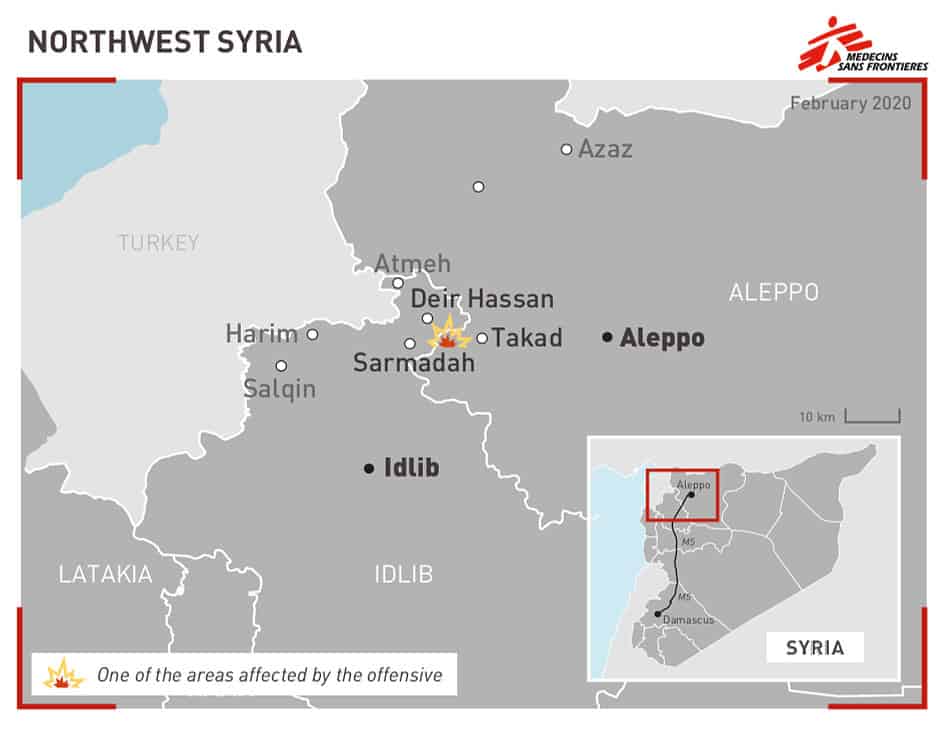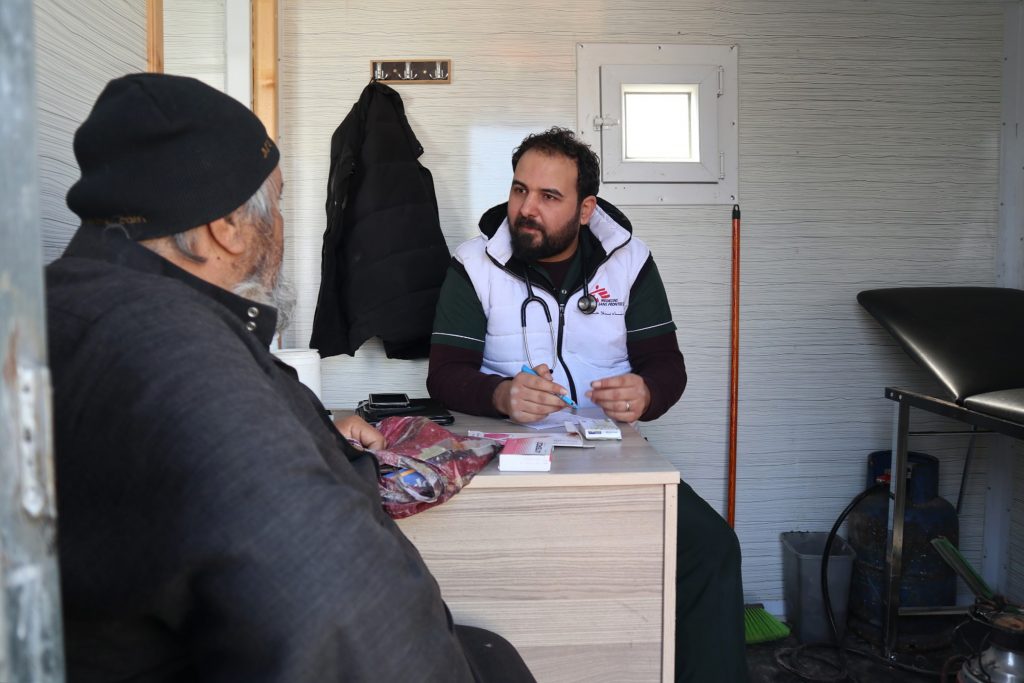In northwest Syria, airstrikes combined with a ground offensive conducted by Syrian government forces and their Russian allies have triggered a huge wave of displacement in the last opposition-held area in the country. With towns and camps west of Aleppo hit by shelling in recent days, roads are packed with cars and trucks as people flee towards a shrinking area of safety.
“People are facing a desperate situation. Attacks are now taking place in areas that were previously considered to be safe,” says Julien Delozanne, MSF head of mission for Syria. “The people fleeing north are being squeezed into a territory that is getting smaller and smaller, between the frontline to the east and the closed Turkish border to the west.”
“Living conditions in the camps for displaced people are already harsh,” says Delozanne. “If the military operation continues, a new influx of people to the area will make the situation even worse.”
Camps and towns shelled, forcing thousands to flee
Syrian government forces have gained control of the highway connecting the cities of Damascus and Aleppo and are now pushing west, threatening densely populated areas to the west of Aleppo.
On 14 and 15 February, shelling struck camps located around the town of Sarmadah, where tens of thousands of people fleeing the fighting in southern Idlib had recently arrived. Several people were wounded, and some tents were destroyed.
The town of Takad, some 20 kilometres further east, has been hit a number of times since 13 February, causing most of the town’s residents to flee.

“Most people are fleeing Takad because of the recent attacks by artillery, missiles and warplanes,” says Mustafa Ajaj, director of the health centre supported by MSF in Takad. “The only people who have stayed are the ones who can’t afford a vehicle or don’t know where to go.”
“We are moving our medical supplies to another location and I am looking for a safe place to resume our activities in an area where the medical needs are becoming more and more urgent,” says Ajaj. “But we have left a few basic medical supplies for the people who are still in Takad.”
No functioning hospitals amid mass displacement and uncertainty
The hospital in the city of Al-Atareb, which had received emergency kits from MSF, had to close on 16 February after attacks on the city. The hospital in Darat-Izaa also closed on 17 February for fear of being bombed. As a result, there is now no functioning hospital in rural west Aleppo province.
With the situation constantly changing, people in northern Idlib province and western Aleppo province – many of whom have already been displaced repeatedly – are experiencing massive uncertainty.
“No one knows what the situation will be tomorrow, only that there are bombings and that government forces are advancing,” says an MSF doctor [1] working in Deir Hassan camp, 30 kilometres west of Aleppo. “We live in fear and stress.”
More than 875,000 people have been displaced within northwest Syria since 1 December 2019, according to the UN. Camps for displaced people are overwhelmed and finding a room to rent is reportedly impossible in towns at any distance from the bombing.
With nowhere else to go, people are pitching tents on hillsides and roadsides or sleeping out in the open.
“There is death under the bombing, and there is another death in the camps – not immediate, but delayed,” said a displaced man who recently arrived with his family in one of the camps where MSF works.
New influxes of bombing leading to new influxes of displaced
“Whenever the bombing intensifies, new people are arriving,” says the MSF doctor in Deir Hassan camp. “Most people are unable to find shelter in the towns to which they flee, so they are forced to pitch their tents wherever they can.”
“These areas are covered in tents, and the closer you get to the Turkish border, the more tents there are. Those who cannot afford a tent are sharing tents with other families,” the MSF doctor continues. “You also see people sitting on roadsides and under olive trees with blankets. Some fled with nothing more than the clothes they were wearing.”
“In the past week, the army has advanced rapidly through the countryside west of Aleppo. People weren’t expecting it. They left their homes in Al Atarib, Abian, Kafr Naha, Kafr Nouran, Maarat-al-Nouman.
Some left on foot because not everyone can get hold of a car.
They walked for kilometres in the cold, without their belongings, without anything to keep them warm.
It’s been snowing for two or three days, here and across the whole of Idlib. You see people sitting on roadsides with blankets. You see women with children in their arms wrapped in blankets. You see children sitting in the snow under olive trees. It makes you cry to see it.
A lot of people are heading towards Afrin and Azaz. They know there are no houses to rent. They might be able to stay with people they know; otherwise they’ll have to stay in the open until someone gives them a tent. Other people are wandering aimlessly and have no idea where they are heading.
In the city of Al-Dana, some people are living in unfinished buildings, with a roof and walls but no windows. But most can’t find a place to stay in town, so they are forced to pitch tents wherever they can.
Some people have dumped all their belongings on the ground because they haven’t got a tent yet and they are living in the open. The people living in the open are freezing. It’s catastrophic.
People of all ages are sick due to the cold weather. People don’t have heating and they don’t have medicines. They left their homes with nothing and so they need everything.
I’m also a displaced person. From the village where I live now, we can hear the bombing close by, coming from the frontlines. It’s scary and it’s stressful. But I’ve become experienced in displacement and I’m always ready to flee at a moment’s notice.
The war has been going for nearly nine years, but this year alone is equivalent to the past nine years if you consider all the difficulties we are living through. This year, the attacks have been brutal, with all kinds of weapons: artillery, airstrikes, rocket launchers, machine guns… People here know that the worst could happen at any moment.
People are lost and have no idea what is going on. Fear has devastated us. We don’t know what’s going on politically and we don’t know what will happen in the future. No one knows what the situation will be tomorrow, only that there are bombings and that government forces are advancing. All we want is a safe place to live.”
Harsh winter leaves displaced in even more precarious situation
Northern Idlib and western Aleppo provinces are now scattered with informal settlements, where displaced people are living in harsh conditions with little protection from the winter cold. Last week, temperatures fell below freezing and heavy snow blocked many roads. A family of four died of suffocation after burning poor quality fuel to heat their tent.
“Our humanitarian situation is very bad,” a father told the MSF team during an aid distribution in a camp. “No heating. No bread. No water. We are burning the leaves of olive trees to get warm. We need support.”

MSF teams providing medical care and winter kits with blankets to displaced
Unsurprisingly, medical staff at MSF’s mobile clinic have treated many patients for respiratory infections as a result of their living conditions and the winter weather. The teams have also provided medical care to significant numbers of pregnant women and children in recent weeks.
MSF has also been responding to the needs of newly arrived people by distributing essential relief items in different locations in rural Idlib province. Since 1 December, MSF teams have distributed blankets, winter clothes and hygiene kits to more than 13,000 people in more than 20 camps and informal settlements in Harim, Salqin, Sarmadah, Killi and Maarat Misrin, as well as heating materials to help people keep warm.
MSF is also distributing drinking water to tens of thousands of people in camps. But people’s needs are huge and, even with all these new activities in place, it is increasingly hard for MSF to provide the displaced people with the assistance they need.
With the ground offensive and airstrikes continuing, people are constantly on the move. Some camps west of Aleppo were evacuated over the weekend. Those who can afford to pay for transport are heading north towards Afrin and Azaz, close to the Turkish border; others travel lesser distances. But wherever they go, no one can be sure that they will receive assistance.
“The war has been going on for nearly nine years,” says the MSF doctor, “but this year alone is equivalent to the past nine years if you consider all the difficulties we are living through.”
[1] For security reasons, the doctor’s name cannot be released.
-
Related:
- Conflict
- Idlib
- Northwestern Syria
- Syria












